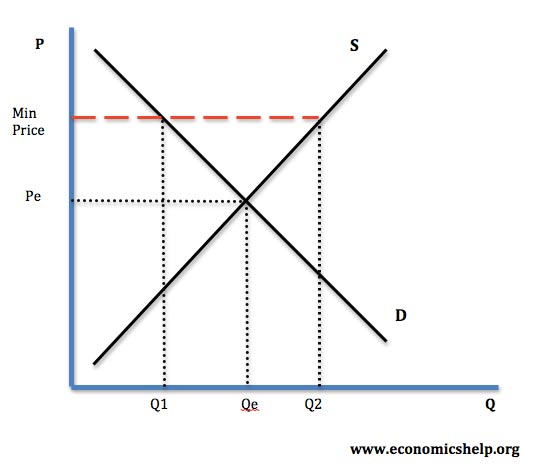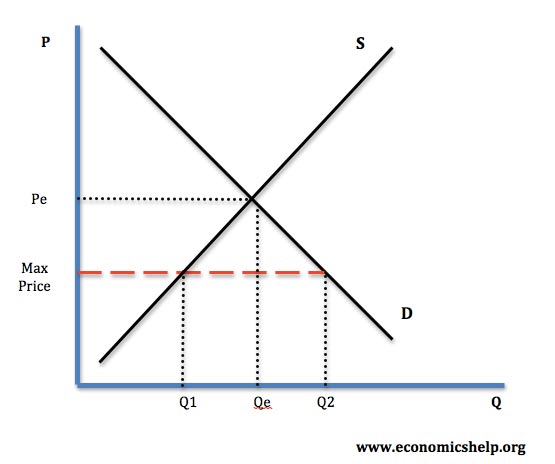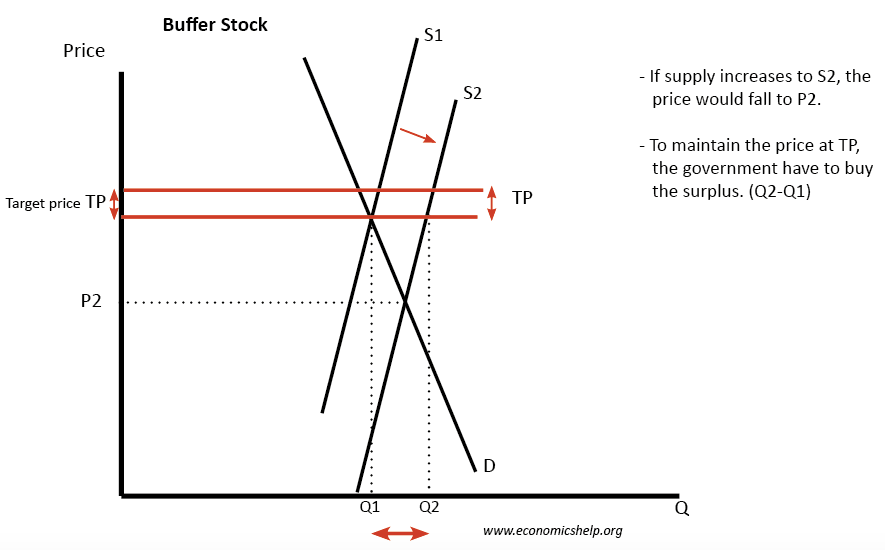Government price controls are situations where the government sets prices for particular goods and services.
Types of price controls
- Minimum prices – Prices can’t be set lower (but can be set above)
- Maximum price – Limit to how much prices can be raised (e.g. market rent)
- Buffer stocks – Where government keep prices within a certain band
- Limiting price increases – In a privatised monopoly (e.g. electricity, gas, water – where there is no competition) the government regulator may play a role in limiting how much prices can be increased. In the UK, regulators use a formula like RPI-X.
- Direct price setting – In a command economy, prices of goods may be set by the government.
Reasons for government price controls
Usually, prices are set the market forces (where supply and demand meet) But there are various reasons governments may wish to intervene in a free market to set prices.
- Make some goods more expensive (e.g. food to increase revenue of farmers or discourage demand for demerit goods.
- Make some goods cheaper (e.g. to make sure housing is affordable)
- To stabilise prices (e.g. prevent rapid fluctuations in the price of food)
Minimum Prices

A minimum price is when the government don’t allow prices to go below a certain level. If minimum prices are set above the equilibrium it will cause an increase in prices.
For example, the EU has used minimum prices for agriculture. It is argued farmers incomes are too low. Therefore, minimum prices have been used to increase prices above the equilibrium. This enables farmers to get a higher revenue.
Problem of minimum prices
The big problem is that this minimum price creates a surplus. Therefore, the government have to purchase the surplus to maintain a minimum price. The Common Agricultural Policy became very expensive because the minimum prices encouraged farmers to supply as much as possible.
- Disadvantages of CAP
- Minimum price for alcohol – prevent the problem of binge drinking
Related to minimum prices is the concept of a minimum wage
Maximum Prices

- This is when the government wish to prevent prices going above a certain level. If a maximum price is placed below the equilibrium, prices will fall.
- But if the price is below the equilibrium, demand will be greater than supply leading to a shortage.
- The government may wish to use maximum prices to reduce the cost of renting a house.
- The government may also use maximum prices for important food-stuffs or pharmaceutical drugs which it wants to make more affordable.
- Advantages and disadvantages of maximum prices
Buffer stocks
A buffer stock is a price control where the government seeks to keep the price within a certain band. It is effectively combining elements of maximum and minimum prices. The aim is to both stabilise prices (and incomes) for farmers and prevent shortages and high prices. If successful, the government buy surplus in a good harvest and then sell surplus if there is a shortage.
See: Buffer stocks
Limiting price increases
In a free-market economy, some industries are natural monopolies (the most efficient number of firms is one). In this case, it is not possible to have effective competition. In the absence of government regulation, the monopoly could charge excessively high prices. As a surrogate for competition, the government regulator can set prices (or limit price increases) to make sure the level of profitability is not excessive.
Regulation of monopolies is often controversial. Consumer groups claim regulators become guilty of ‘regulatory capture’ whilst companies can complain they are starved of funds for investment.
Direct price setting
In a command economy (Communist) the government play an important role in deciding what to produce, how to produce and what prices to charge. In this situation, market forces are ignored and the government set the most ‘socially efficient’ prices.
Related


I am not getting clear answers to my question
Please let me know the measures by which a minimium price for an agricultural commodity can be made effective
By reducing the subsides given to agricultural sector.
By increasing the tax rate so as to increase the cost of production.
By advertising.
By increase the tariff of substitute goods
How does the government help set prices in each market?
It is because they decide whether consumers are paying too much or too little for a good or service. For example when there is little competition in a market (like energy companies), firms can decide upon a high price which the consumers must pay. This is where the government need to intervene and control the prices.
I always thought that the U. S. government had no authority to tell any business how they can charge for a product or service. An exception would be fuel for transportation. But rent? Food? They don’t seem to ha e controls regarding Healthcare otherwise we would not have had $1000 epipens.
More research required people
Please try to put more effective and direct reply to the question given
Why does the government control prices
I am concern about price inflation in South Sudan. I am wondering whether price “monitoring” rather than “control” as a policy should be adapted.
Please, share your thoughts
Sincerely yours
Ukech Ujure Kidi
Market price control is more beneficial than minimum wage increment….help me debate…I support the motion.